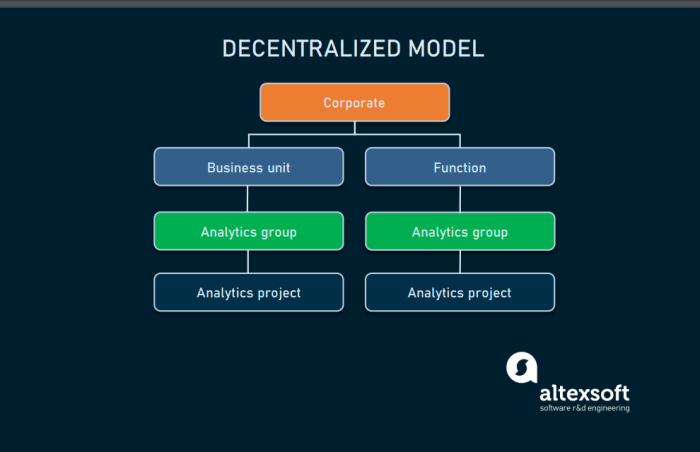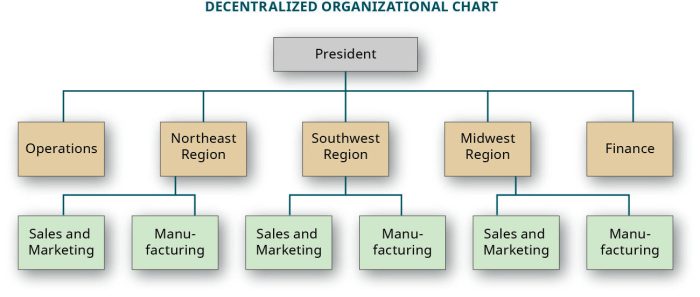Decentralization is usually desirable in a company when decision-making, innovation, and growth converge. By empowering employees, fostering creativity, and enhancing adaptability, decentralized structures unlock a world of possibilities for organizations seeking to thrive in today’s dynamic business landscape.
Decentralization empowers employees to make timely decisions without relying on central authority, fostering a culture of experimentation and risk-taking, and giving employees greater autonomy and responsibility. These factors collectively contribute to increased job satisfaction, employee engagement, and a sense of ownership and accountability.
Decentralization: Empowering Organizations for Success

Decentralization is a management strategy that involves distributing decision-making authority and responsibility to lower levels within an organization. This approach empowers employees to make timely decisions without relying on central authority, leading to increased efficiency, innovation, and employee engagement.
Decision-Making Efficiency: Decentralization Is Usually Desirable In A Company When

Decentralization empowers employees to make decisions quickly and effectively without having to seek approval from higher levels of management. This reduces bureaucracy and allows organizations to respond more rapidly to changing market conditions. For example, a decentralized sales team can make pricing decisions on the spot, enabling them to close deals faster and increase revenue.
Innovation and Creativity
Decentralization fosters a culture of experimentation and risk-taking. When employees have the autonomy to make decisions, they are more likely to explore new ideas and develop innovative solutions. For instance, a decentralized product development team may have the freedom to experiment with different design concepts, leading to more creative and groundbreaking products.
Employee Empowerment and Ownership, Decentralization is usually desirable in a company when
Decentralization empowers employees by giving them greater autonomy and responsibility. This leads to increased job satisfaction and employee engagement. When employees feel like they have a say in the decision-making process, they are more invested in the organization’s success. Moreover, decentralized structures promote a sense of ownership and accountability, as employees are directly responsible for the outcomes of their decisions.
Scalability and Growth
Decentralization enables companies to scale their operations effectively. By distributing decision-making authority, organizations can avoid bottlenecks and delays that are common in centralized structures. This allows companies to accommodate growth and expansion without sacrificing efficiency. For example, a decentralized supply chain management system can enable a company to manage a wider network of suppliers and distribution channels, supporting its growth strategy.
Adaptability and Resilience
Decentralization enhances a company’s ability to adapt to changing market conditions. When decisions are made at lower levels, organizations can respond more quickly to disruptions and unforeseen challenges. For instance, a decentralized disaster recovery plan can empower local teams to take immediate action in the event of an emergency, minimizing business disruption.
Knowledge Sharing and Collaboration
Decentralization promotes knowledge sharing and collaboration across the organization. When employees have the autonomy to make decisions, they are more likely to share their expertise and collaborate with others. Decentralized teams can leverage collective expertise to drive innovation and problem-solving.
For example, a decentralized R&D team may be able to tap into the knowledge of a wider pool of experts, leading to more effective research and development outcomes.
Question & Answer Hub
What are the key benefits of decentralization?
Decentralization offers numerous benefits, including improved decision-making efficiency, enhanced innovation and creativity, increased employee empowerment and ownership, greater scalability and growth potential, and improved adaptability and resilience.
How does decentralization promote innovation?
Decentralized structures foster a culture of experimentation and risk-taking, encouraging employees to explore new ideas and challenge the status quo. This environment stimulates innovation and leads to the development of groundbreaking solutions.
How does decentralization impact employee morale?
Decentralization empowers employees by giving them greater autonomy and responsibility, which can lead to increased job satisfaction and employee engagement. Employees feel more valued and motivated when they have a say in decision-making and are accountable for their own work.
